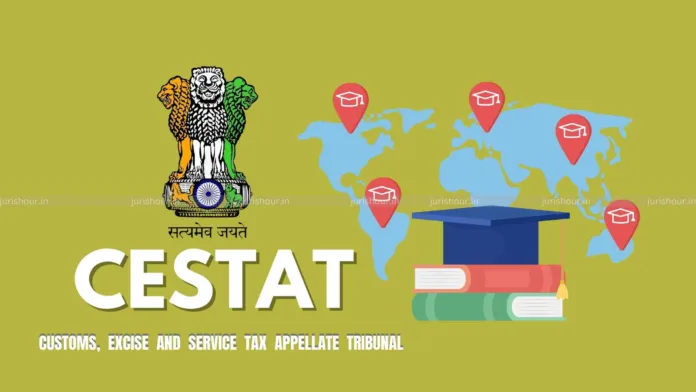The Delhi Bench of Customs, Excise and Service Tax Appellate Tribunal (CESTAT) has held that consultancy services to the foreign university/foreign group entity do not fall under the category of “intermediary services” and the appellants-service provider are eligible for the benefit of “export of services‟.
The bench of Binu Tamta (Judicial Member) and P.V. Subba Rao (Technical Member) has observed that in respect of intermediate services, there should be a minimum of three parties and two distinct supplies, i.e., main supply and ancillary supply. It was also clarified that a person involved in supply of main supply on principal to principal basis to another person cannot be considered as a supplier of intermediary service.
The appellant/assessee is in the business of providing range of consultancy services including exploring development opportunities in Indian market to international educational organizations. For carrying out this activity, the appellant has entered into an agreement with various universities all over the world, whereby the appellant agrees to enlighten the prospective students in India with the opportunities abroad.
In some cases, the appellant enters into agreement with its own group entities located outside India, who have existing arrangement or agreements with foreign universities and these foreign group entities have subcontracted its entire exercise to the appellant.
In both the cases, the appellant is paid consultation fees in convertible foreign exchange either by the foreign universities or by the group entities on the basis of the cost incurred by the appellant. The appellant was classifying its activities as export of services in its ST-3 Returns and was, therefore, not paying any service tax.
The agreement between the appellant and the group entities involved more than two parties as designated advisers has been appointed by the appellant in India who were representing and reporting to the universities abroad.
The department was of the opinion that the appellant has been carrying out the activity of arranging /facilitating the enrolment of students in foreign universities and was actually operating as an “intermediary‟ within the definition of 2(f)of POPS Rules.
Thus, under the agreement, appellant is providing services relating to facilitating the educational services between the foreign universities and the Indian students. On adjudication, the demand was confirmed, holding that the appellant is operating as an “intermediary‟ in terms of Rule 2(f) of POPS Rules and since the location of the appellant is in India, the provision of service is in the taxable territory, which will be taxable in the hands of the appellant. The appellant has preferred the appeals before the Tribunal.
The tribunal held that the main activity of providing education is undertaken by the universities, for which the universities process applications and extend admission to students whereas the appellant neither provides education nor extends admission to the students. The appellant is only required to undertake the promotional activities of foreign universities in India. All the activities performed by the appellant are part of the contract with the foreign universities located outside India.
Case Details
Case Title: M/S.Sannam S-4 Management Services India Pvt. Ltd. Versus The Commissioner of CGST
Case No.: Service Tax Appeal No.50666 of 2024
Date: 29.04.2025
Counsel For Appellant: B.L. Narsimhan
Counsel For Respondent: Aejaz Ahmad
Read More: CA vs CS vs CMA: Which Profession Should You Choose?





